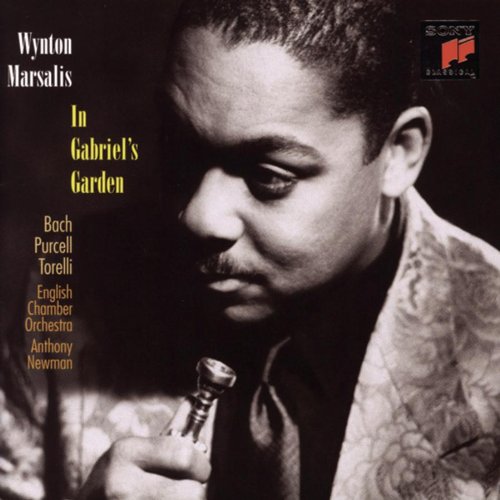 With 17 years of piano lessons (most done with really poor teachers, some done with really fantastic teachers), I’m firmly grounded in notes and classical technique. While this provides an excellent foundation for playing well, it’s not a great foundation for playing what is on your heart and mind.
At one time classical technique was rooted in improvisation [citation] but this has long since calcified (perhaps not unlike our faith?). While my piano teacher would tell me which publisher to purchase a specific piece from in order to assure correct fingers are annotated, she would then continue to specify exactly what was to be played at each flourish – precise notes, fingering, and timing. This was never the intent of these flourishes, as each was to be improvised.
Jazz trumpeter Wynton Marsalis duly illustrates this in the baroque recording: In Gabriel’s Garden. While a casual listener could be forgiven for believing this to be one more classical recording, a seasoned ear will be surprised by the note choices. Wynton improvises them, not using Jazz chords as one might fear, but by staying faithful to the expected scale and using anything but the prescribed choices. In doing so, I would argue Wynton is being more faithful to the original than those who would repeat musical orthodoxy.
To break away from notes and the “correct” way to play a piece represents no small undertaking for the trained musician. I’ve now spent more time trying to unlearn notes than I did learning notes, and I continue to work at it.
To make progress, I can recommend two main techniques:
With 17 years of piano lessons (most done with really poor teachers, some done with really fantastic teachers), I’m firmly grounded in notes and classical technique. While this provides an excellent foundation for playing well, it’s not a great foundation for playing what is on your heart and mind.
At one time classical technique was rooted in improvisation [citation] but this has long since calcified (perhaps not unlike our faith?). While my piano teacher would tell me which publisher to purchase a specific piece from in order to assure correct fingers are annotated, she would then continue to specify exactly what was to be played at each flourish – precise notes, fingering, and timing. This was never the intent of these flourishes, as each was to be improvised.
Jazz trumpeter Wynton Marsalis duly illustrates this in the baroque recording: In Gabriel’s Garden. While a casual listener could be forgiven for believing this to be one more classical recording, a seasoned ear will be surprised by the note choices. Wynton improvises them, not using Jazz chords as one might fear, but by staying faithful to the expected scale and using anything but the prescribed choices. In doing so, I would argue Wynton is being more faithful to the original than those who would repeat musical orthodoxy.
To break away from notes and the “correct” way to play a piece represents no small undertaking for the trained musician. I’ve now spent more time trying to unlearn notes than I did learning notes, and I continue to work at it.
To make progress, I can recommend two main techniques:
- Have a friend start improvising something in an unannounced key. Play along. (I use this as an audition technique).
- Start up a music player on random, or better yet use Pandora so you’re potentially hearing unfamiliar songs but in a specified genre. Play along.
The heart has its reasons which reason knows nothing of… We know the truth not only by the reason, but by the heart. – Blaise Pascal


